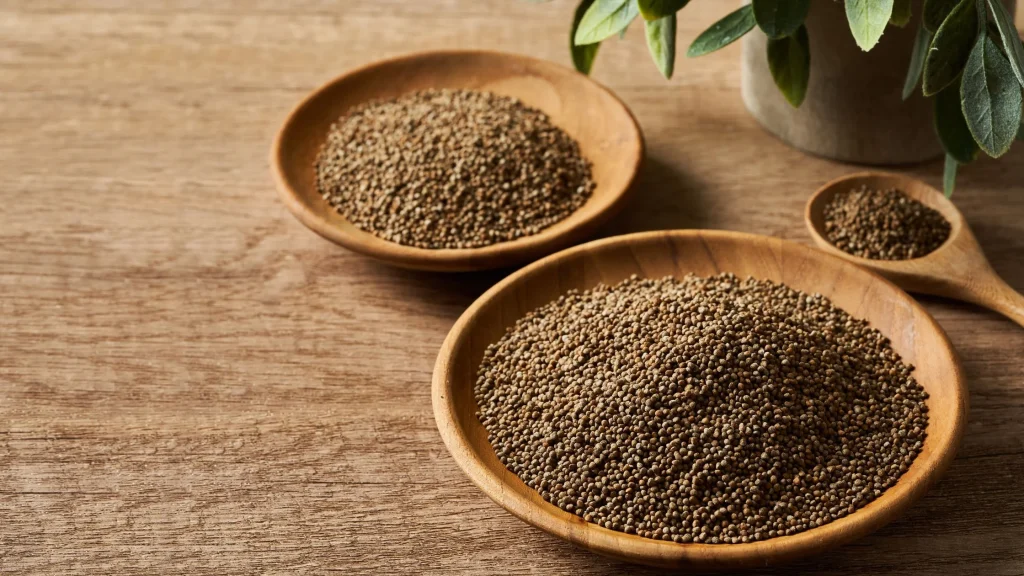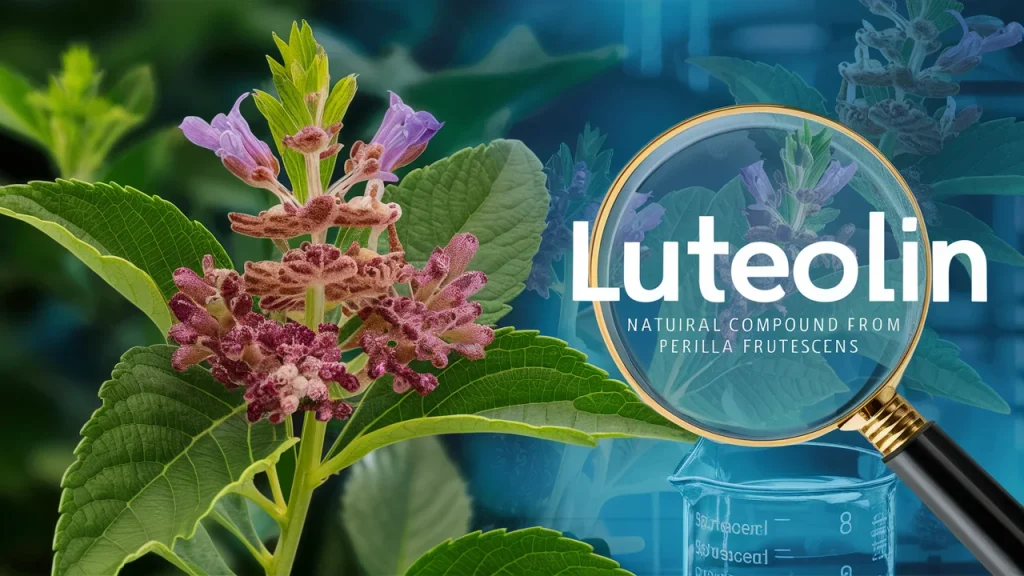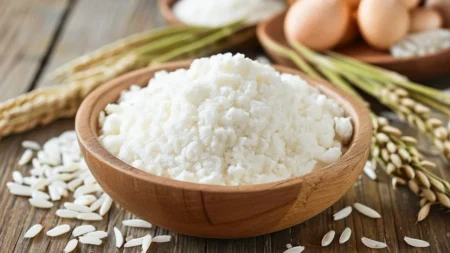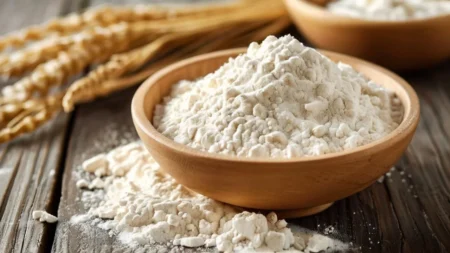Luteolin, a powerful antioxidant and anti-inflammatory flavonoid, is found abundantly in the leaves of the perilla plant (Perilla frutescens). This natural compound offers a wide range of health benefits, including neuroprotective effects and potential skin benefits. As a plant-based nutrient, luteolin has gained attention in both traditional and modern medicine for its therapeutic properties.

Key Takeaways
- Luteolin is a potent antioxidant and anti-inflammatory flavonoid found in the leaves of the perilla plant.
- Luteolin has been studied for its neuroprotective effects and potential skin benefits.
- As a plant-based nutrient, luteolin has gained attention in traditional and modern medicine.
- Luteolin’s anti-inflammatory properties make it a promising natural remedy for various health conditions.
- Ongoing research continues to uncover the therapeutic potential of luteolin in various areas of health and wellness.
Luteolin (Perilla Frutescens): An Introduction
Perilla frutescens, also known as the perilla plant or shiso, is a herb native to Asia and has been used in traditional medicine for centuries. The leaves of the perilla plant are a rich source of luteolin, a flavonoid with powerful antioxidant and anti-inflammatory properties. Luteolin is found in various plants, including herbs, fruits, and vegetables, but it is particularly abundant in perilla leaves. This natural compound has garnered attention for its potential to offer neuroprotective effects and skin benefits, making it a valuable addition to the realm of herbal medicine and dietary supplements.
Perilla: The Potent Herb
The perilla plant, or Perilla frutescens, is a member of the mint family and has been used in traditional Asian medicine for centuries. The leaves of the perilla plant are known for their distinct flavor and aroma, and they are widely used in culinary applications across East Asian cuisines. However, beyond their culinary uses, the plant-based nutrients found in perilla leaves, particularly the antioxidant flavonoid luteolin, have been the subject of growing scientific interest.
Luteolin: The Antioxidant Flavonoid
Luteolin is a potent antioxidant flavonoid that is abundantly present in the leaves of the perilla plant. This natural compound has demonstrated a range of beneficial anti-inflammatory properties, neuroprotective effects, and potential skin benefits. Researchers have been exploring the therapeutic potential of luteolin, as it may offer a natural and holistic approach to supporting overall health and well-being.
Anti-Inflammatory Properties of Luteolin
One of the primary health benefits of luteolin, a potent antioxidant and anti-inflammatory flavonoid found in perilla frutescens, is its ability to reduce inflammation. Studies have shown that luteolin can inhibit the production of pro-inflammatory cytokines, enzymes, and mediators, such as interleukin-6 (IL-6), tumor necrosis factor-alpha (TNF-α), and cyclooxygenase-2 (COX-2). This mechanism of action helps to reduce inflammation at the cellular level, making luteolin a promising natural alternative for managing inflammatory conditions.
The anti-inflammatory properties of luteolin have been investigated in the context of various health issues, including cardiovascular disease, arthritis, and skin disorders. By modulating the inflammatory pathways, luteolin may offer therapeutic benefits for individuals seeking natural remedies and traditional medicine approaches to address health benefits related to phytochemicals and anti-inflammatory support.
| Inflammatory Marker | Effect of Luteolin |
|---|---|
| Interleukin-6 (IL-6) | Inhibition |
| Tumor Necrosis Factor-alpha (TNF-α) | Inhibition |
| Cyclooxygenase-2 (COX-2) | Inhibition |
This table summarizes the anti-inflammatory effects of luteolin on key inflammatory markers, demonstrating its potential as a natural remedy for managing inflammatory conditions.
Neuroprotective Effects of Luteolin
In addition to its anti-inflammatory properties, luteolin, a natural compound found in perilla frutescens, has also demonstrated neuroprotective effects, making it a potential therapeutic agent for various neurological conditions. Studies have shown that luteolin can protect the brain by modulating oxidative stress, reducing inflammation, and regulating neurotransmitter levels. This suggests that luteolin may play a role in maintaining cognitive function and supporting overall brain health.
Luteolin and Brain Health
The neuroprotective potential of luteolin has been extensively studied, revealing its ability to safeguard the brain from various insults. Luteolin’s antioxidant and anti-inflammatory properties have been found to protect brain cells from oxidative damage, which is a key contributor to the development of neurodegenerative disorders. Furthermore, luteolin has been shown to modulate the levels of critical neurotransmitters, such as acetylcholine and dopamine, which are essential for maintaining cognitive function and neurological well-being.
Potential Benefits for Neurological Disorders
The neuroprotective effects of luteolin have garnered significant attention in the context of neurological disorders. Emerging research suggests that this natural compound may offer therapeutic benefits for conditions like Alzheimer’s disease and Parkinson’s disease. Luteolin’s ability to reduce neuroinflammation, enhance antioxidant defense, and regulate neurotransmitter levels has been investigated as a potential strategy for managing the symptoms and progression of these neurodegenerative diseases. As a plant-based nutrient, luteolin presents a promising alternative to traditional pharmacological interventions, providing a natural approach to supporting brain health and neurological function.
Luteolin (Perilla Frutescens): Skin Benefits and Beyond
In addition to its anti-inflammatory and neuroprotective effects, luteolin has also been studied for its potential benefits for the skin. The antioxidant and anti-inflammatory properties of luteolin may help protect the skin from environmental stressors, such as UV radiation and pollution, while also promoting skin health. Luteolin has been found to exhibit photoprotective effects, reducing the damaging impact of UV exposure on the skin.
Skin-Protective Properties
Additionally, luteolin may have the potential to address various skin-related issues, such as acne, eczema, and even skin aging. The natural compound found in perilla frutescens may offer a promising approach to maintaining healthy, vibrant skin.
Other Potential Health Benefits
Beyond these skin-specific benefits, luteolin has also been investigated for its potential to support cardiovascular health, immune function, and overall well-being. As a plant-based nutrient, luteolin presents a versatile and compelling option for individuals seeking to incorporate natural compounds into their health and wellness regimen.
Conclusion
Luteolin, a potent antioxidant and anti-inflammatory flavonoid found in perilla frutescens, offers a wide range of health benefits. From its ability to modulate inflammation and provide neuroprotective effects to its potential skin-protective properties, luteolin has gained attention in the realm of natural remedies and herbal medicine. As a plant-based nutrient, luteolin presents a promising alternative for individuals seeking to incorporate natural compounds into their health and wellness regimen.
Further research continues to uncover the vast therapeutic potential of this versatile flavonoid, making it a valuable addition to the growing field of phytochemicals and their applications in promoting overall well-being. Whether incorporated through dietary supplements or as part of a holistic approach, luteolin from perilla frutescens holds promise as a natural solution for supporting the body’s antioxidant, anti-inflammatory, and neuroprotective functions.
As the scientific community continues to explore the multifaceted benefits of this remarkable flavonoid, the potential for luteolin to become a valuable tool in the pursuit of natural health and wellness only continues to grow. By harnessing the power of plant-based nutrients like luteolin, individuals can take a proactive step towards enhancing their overall health and quality of life.
FAQ
What is luteolin, and where does it come from?
Luteolin is a powerful antioxidant and anti-inflammatory flavonoid that is found abundantly in the leaves of the perilla plant (Perilla frutescens), also known as the perilla or shiso herb. Perilla frutescens is a herb native to Asia and has been used in traditional medicine for centuries.
What are the health benefits of luteolin?
Luteolin offers a wide range of health benefits, including potent anti-inflammatory properties, neuroprotective effects, and potential skin benefits. Studies have shown that luteolin can inhibit the production of pro-inflammatory molecules, protect the brain by reducing oxidative stress and inflammation, and exhibit photoprotective effects to safeguard the skin from environmental stressors.
How does luteolin work as an anti-inflammatory?
Luteolin’s anti-inflammatory properties are attributed to its ability to inhibit the production of pro-inflammatory cytokines, enzymes, and mediators, such as interleukin-6 (IL-6), tumor necrosis factor-alpha (TNF-α), and cyclooxygenase-2 (COX-2). This mechanism of action helps to reduce inflammation at the cellular level, making luteolin a promising natural alternative for managing inflammatory conditions.
Can luteolin provide neuroprotective benefits?
Yes, studies have shown that luteolin possesses neuroprotective effects, suggesting it may play a role in maintaining cognitive function and supporting overall brain health. Luteolin can protect the brain by modulating oxidative stress, reducing inflammation, and regulating neurotransmitter levels. Its neuroprotective potential has been investigated in the context of neurodegenerative diseases, such as Alzheimer’s and Parkinson’s.
What are the potential skin benefits of luteolin?
Luteolin’s antioxidant and anti-inflammatory properties may help protect the skin from environmental stressors, such as UV radiation and pollution, while also promoting overall skin health. Luteolin has been found to exhibit photoprotective effects, reducing the damaging impact of UV exposure on the skin. Additionally, luteolin may have the potential to address various skin-related issues, such as acne, eczema, and skin aging.
Can luteolin be used as a dietary supplement or in herbal medicine?
Yes, luteolin, derived from the perilla plant, is often used as a dietary supplement or in the context of herbal medicine due to its wide range of health benefits. As a plant-based nutrient, luteolin is gaining attention as a natural alternative for individuals seeking to incorporate therapeutic compounds into their health and wellness regimen.











